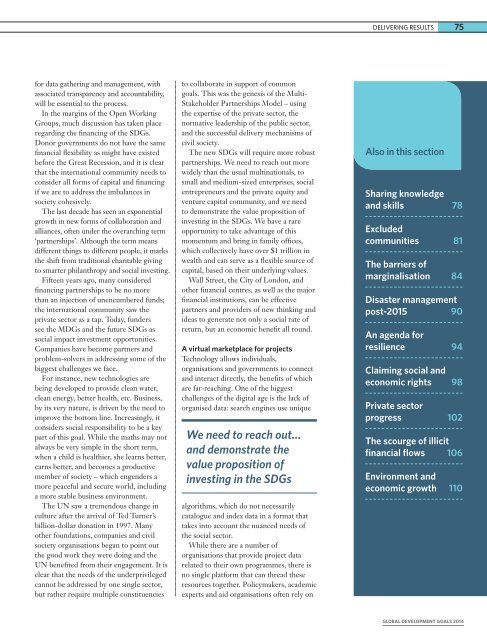FAMBB
FAMBB
FAMBB
You also want an ePaper? Increase the reach of your titles
YUMPU automatically turns print PDFs into web optimized ePapers that Google loves.
DELIVERING RESULTS75for data gathering and management, withassociated transparency and accountability,will be essential to the process.In the margins of the Open WorkingGroups, much discussion has taken placeregarding the financing of the SDGs.Donor governments do not have the samefinancial flexibility as might have existedbefore the Great Recession, and it is clearthat the international community needs toconsider all forms of capital and financingif we are to address the imbalances insociety cohesively.The last decade has seen an exponentialgrowth in new forms of collaboration andalliances, often under the overarching term‘partnerships’. Although the term meansdifferent things to different people, it marksthe shift from traditional charitable givingto smarter philanthropy and social investing.Fifteen years ago, many consideredfinancing partnerships to be no morethan an injection of unencumbered funds;the international community saw theprivate sector as a tap. Today, funderssee the MDGs and the future SDGs associal impact investment opportunities.Companies have become partners andproblem-solvers in addressing some of thebiggest challenges we face.For instance, new technologies arebeing developed to provide clean water,clean energy, better health, etc. Business,by its very nature, is driven by the need toimprove the bottom line. Increasingly, itconsiders social responsibility to be a keypart of this goal. While the maths may notalways be very simple in the short term,when a child is healthier, she learns better,earns better, and becomes a productivemember of society – which engenders amore peaceful and secure world, includinga more stable business environment.The UN saw a tremendous change inculture after the arrival of Ted Turner’sbillion-dollar donation in 1997. Manyother foundations, companies and civilsociety organisations began to point outthe good work they were doing and theUN benefited from their engagement. It isclear that the needs of the underprivilegedcannot be addressed by one single sector,but rather require multiple constituenciesto collaborate in support of commongoals. This was the genesis of the Multi-Stakeholder Partnerships Model – usingthe expertise of the private sector, thenormative leadership of the public sector,and the successful delivery mechanisms ofcivil society.The new SDGs will require more robustpartnerships. We need to reach out morewidely than the usual multinationals, tosmall and medium-sized enterprises, socialentrepreneurs and the private equity andventure capital community, and we needto demonstrate the value proposition ofinvesting in the SDGs. We have a rareopportunity to take advantage of thismomentum and bring in family offices,which collectively have over $1 trillion inwealth and can serve as a flexible source ofcapital, based on their underlying values.Wall Street, the City of London, andother financial centres, as well as the majorfinancial institutions, can be effectivepartners and providers of new thinking andideas to generate not only a social rate ofreturn, but an economic benefit all round.A virtual marketplace for projectsTechnology allows individuals,organisations and governments to connectand interact directly, the benefits of whichare far-reaching. One of the biggestchallenges of the digital age is the lack oforganised data: search engines use uniqueWe need to reach out…and demonstrate thevalue proposition ofinvesting in the SDGsalgorithms, which do not necessarilycatalogue and index data in a format thattakes into account the nuanced needs ofthe social sector.While there are a number oforganisations that provide project datarelated to their own programmes, there isno single platform that can thread theseresources together. Policymakers, academicexperts and aid organisations often rely onAlso in this sectionSharing knowledgeand skills 78Excludedcommunities 81The barriers ofmarginalisation 84Disaster managementpost-2015 90An agenda forresilience 94Claiming social andeconomic rights 98Private sectorprogress 102The scourge of illicitfinancial flows 106Environment andeconomic growth 110GLOBAL DEVELOPMENT GOALS 2014


